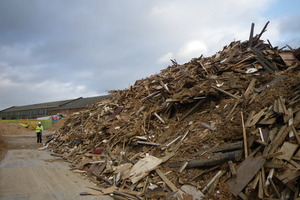Background
Prime Biomass Limited was set up in 2012 with the aim of processing waste wood for use as fuel. A contract was signed with a large WtE plant in Sweden. The business plan was to process wood, temporarily store it at dockside (under LWR432) and when there was a sufficient load (meeting minimum contractual requirements) to ship directly to the customer.
The company leased a site at Dover’s Corner Industrial Estate in Essex, which appeared to be an ideal base for a small-scale recycling operation to start the business. The company began operating in early 2013 under a T6 exemption which allowed it to treat and store up to 500 tonnes of wood waste per week. Meanwhile the company set about applying for planning consent and a Standard Rules Permit receiving advice and guidance from the Environment Agency’s (EA) site officer.

Unbeknown to the directors at the time, Dover’s Corner industrial estate had already been identified as a site for residential development. The various landowners had been negotiating with developers and outline planning permission had already been granted.
Operational difficulties began to arise. The standard rules permit, which took months to process, was rejected – the site was within 500m of a SSSI. The first shipment of wood was significantly delayed; the EA had a backlog of TFS applications and it took months before the application was granted. During this time, the EA withdrew LWR432 and replaced it with RPS131 requiring wood chip at dockside to be stored in a secure place i.e. in a building. The EA stopped the company storing further wood at the dockside leaving wood to accumulate at the site and insufficient wood at the dockside to ship. Eventually, the EA agreed wood could be taken to the docks and the first ship sailed. A consultant was instructed to apply for bespoke permits.
The site came into and out of compliance as the business battled with the impacts of various difficulties. Throughout the period, the EA still treated the site as exempt and regulated it in that way. One Director invested £100,000 of his own money into the business. The financial constraints on the business proved too much. The delays in shipping resulted in termination of the contract. In any event, the site was earmarked for development and the company was never going to be allowed to expand. The company went into liquidation, leaving at least 1,500 tonnes of wood waste on the site. It was at this point the EA deregistered the exemption and notified the directors the site was an illegal operation.
The legal proceedings
Regulation 41 EPR provides that directors can be held personally liable for a company’s offence if it was committed with their consent or connivance, or if it was attributable to their neglect. The EA eventually prosecuted the three directors for Operating a Regulated Facility without a Permit on the basis the company had breached the conditions of the T6 exemption in two respects: (a) it had breached the specific T6 condition which limited the operation to 500 tonnes per week; and (b) it had breached the general condition in Sch 2, Para 4(1)(c) EPR, which requires the exempt operation to meet the objectives of Art 13 of the Waste Framework Directive (ie. to avoid harm to the environment).
Two of the directors were convicted at trial in 2018, and the third was acquitted by the jury.
The Court of Appeal Decision
The two directors appealed on the grounds that the exemption had remained in existence and that the EA should have de-registered the exemption before taking enforcement action.
The Court of Appeal rejected this ground (see EA v MM and FB [2020] EWCA Crim 597). De-registration was not a necessary step. The exemption automatically ceased to have legal effect during any period when its conditions were being breached.
The sentencing hearing
The Judge rejected the EA’s contention that the directors had deliberately breached the legislation and sentenced on the basis that they had been negligent. The Judge also rejected the EA’s case on harm, holding that this was a Category 2 case because there had been significant costs incurred in removing the wood.
The first director was given a conditional discharge, no financial orders but was disqualified from acting as a Director for 5 years.
The second director was fined £4,000. He was ordered to pay compensation to the landlord of £30,000 and £16,000 towards the EA’s costs. The Judge refused to disqualify him as a director.
Lessons for Operators
1. Factor into any business plans potentially significant delays in obtaining a permit/TFS notifications;
2. Take advice from an experienced consultant to ensure you apply for the right permit;
3. Always have a contingency plan when relying upon a RPS, which can change anytime;
4. Don’t rely upon the bare fact the exemption is registered as legitimising the operation on site. If the operator breaches the conditions, it automatically ceases to have any legal effect whether or not the EA applies to de-register. For as long as the operator is out of compliance, it is committing the offence of operating without a permit;
5. It is not enough to comply with the specific conditions of an exemption, such as stocking limits. It is equally important for the operator to comply with general condition of operating in accordance with the objectives of Art 13 of WFD (e.g. without harm to the environment from dust). Exemptions should never be viewed as an ‘easy’ way of legitimising a waste operation, however small the scale. Operators must take care to ensure that all conditions of the exemption are complied with.
6. Always carry out due diligence when selecting a site. Superficially, this light industrial estate was ideal for a small-scale waste operation to expand. Further enquiries would have revealed that the site was already earmarked for housing development and there was never any realistic prospect of developing the operation.
Lessons for Directors

1. Directors can be held personally responsible for an offence on the basis of negligence.
2. Company Directors are entitled to delegate responsibility to managers and other staff, but they must take care to ensure that their staff are competent for the role and that they were adequately supervised.
3. Where directors become aware that things are starting to go wrong on site, they must be prepared to take swift and effective action to get on top of the problems. Where financial problems start to affect an operator’s ability to comply with its permit, directors must also be wary of the temptation to try to trade their way out of difficulties: sometimes a modest problem can become much worse, leading to significant costs and criminal liability and director disqualification.
Lessons for Landowners
1. Landowners should take great care before permitting a waste operation to take place on their land. Failure to secure a guarantee or bond when leasing to a limited liability ‘start up’ recycling company could result in a large bill for clean up costs with no direct means of recovering those costs from the liquidated company.
2. In R v Walker & Sons (Hauliers) Ltd [2014] EWCA Crim 100, the Court of Appeal held that a landowner may commit an offence of ‘knowingly permitting’ an offence of operating a regulated facility without a permit simply by allowing the operation to take place on their land. The landowner was perhaps lucky not to be prosecuted himself. The EA does not have to prove that the landowner knew that the operation was taking place without a permit. Often, the EA will use the threat of prosecution as a leverage to require a landowner to remove waste from their land or alternatively serve a statutory notice.
3. Landlords are well advised to have a suitable clause in the lease and make regular inspections of the land to ensure that illegal waste deposits are not permitted to accumulate.
Conclusions
This was not a case of rogue operators who set out to break the law. The EA’s allegation that the operators had deliberately disregarded the Regulations was rejected by the Judge. However, even a short period of non-compliance with an exemption is enough to amount to an offence; and negligence can be enough for a director to become personally liable.
With hindsight, it may be questioned whether a criminal prosecution was the appropriate enforcement response. The EA’s costs in this case were over £250,000. The outcome was an acquittal and a Conditional Discharge for one director and a £4,000 fine for the other.
The EA has a significant responsibility in choosing whether or not a case requires a criminal prosecution especially when budgetary constraints are cited for not pursuing rogue operators. There is a world of difference between well-meaning operators who make mistakes and rogue operators who set out to profit from crime and deliberately have no regard for the environment.
As in all such cases, there are lessons for all parties to learn.
AUTHORS: Dr. Anna Willetts, Partner at Gunnercooke; Andrew Thomas QC, Lincoln House Chambers; and Samantha Riggs, 25 Bedford Row, acted for one of the defendants in the case











Subscribe for free